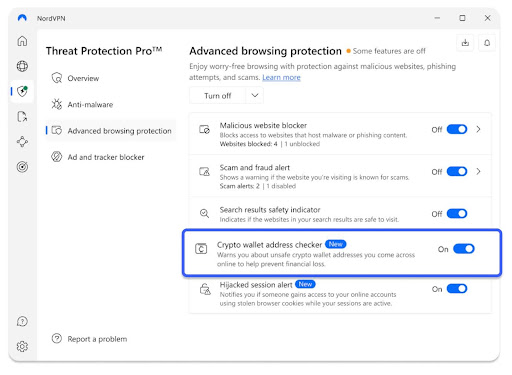Forget crypto scams – NordVPN’s new tool helps you keep your funds safe
Threat Protection Pro's crypto wallet checker scans wallet addresses in real-time

- NordVPN has released a crypto wallet address checker tool to combat crypto scams
- The new feature warns Windows and macOS users of scam addresses
- It broadens Threat Protection Pro's already comprehensive protection
A new line of defense against crypto scams has landed in NordVPN’s Threat Protection Pro suite.
NordVPN’s crypto wallet address checker scans web pages for crypto wallet addresses and cross-checks them against fraud databases. It then alerts you to any dangerous wallets, making it easier for you to avoid costly crypto transactions.
The rising popularity of cryptocurrency – Bitcoin in particular – has resulted in a surge in crypto scams, with over $1.5 billion lost to crypto hacks and scams in Q1 2025 alone. In response, NordVPN, one of the best VPN services, has rolled out the crypto wallet address checker.
The latest addition can be found in NordVPN’s Windows and macOS apps, and builds on Threat Protection Pro’s existing ability to block ads, trackers, and phishing sites, the latter of which earned certified phishing protection from AV-Comparatives.
Inside NordVPN’s Crypto Wallet Address Checker

NordVPN’s crypto wallet address checker scans all text locally on your device, looking for strings that match the format of popular wallet addresses such as Bitcoin and Ethereum. No data leaves your device during this process.
If the tool detects a crypto wallet address, it sends that address outside your device and compares it against a constantly updated list of addresses reported for phishing, ransomware payouts, and other scams. No other personal information, such as your page content or browsing history, is sent from your device.
Should the crypto wallet address checker find a match, it marks the offending wallet address on your screen. Hovering your cursor over the wallet address displays a warning that the address is unsafe.
"The wallet address checker helps protect users from cryptocurrency fraud, which, according to the FBI, accounts for 50% of all financial fraud losses," said Domininkas Virbickas, product director at NordVPN.
What you can do to keep your crypto safe
NordVPN subscribers can already take advantage of the new feature by opening the NordVPN macOS or Windows VPN app, navigating to "Threat Protection Pro," clicking "Advanced browsing protection," and toggling "Crypto wallet address checker."
NordVPN’s crypto wallet address checker is a line of defense against crypto fraud, but it is still no replacement for common sense. Even with the crypto wallet address checker turned on, there are some things you can do to further protect yourself.
Virbickas particularly recommends crypto users to resist the urge to click blindly on crypto links, especially those promising free coins, airdrops, or urgent financial returns.
"These tactics prey on fear and greed, but verifying sources and addresses can save you from significant financial loss. Our wallet address checker is designed to be that extra pair of eyes, but smart browsing habits remain your first line of defense," Virbickas added.
Stick to trusted exchanges and wallets and use two-factor authentication (2FA) to provide accounts with an extra layer of security. Keeping your browser, extensions, antivirus software, and NordVPN up to date closes security gaps before attackers can exploit them.
Crypto scams have become increasingly more elaborate, impersonating influential figures such as Elon Musk and mimicking trusted platforms like Binance. This makes the arrival of NordVPN’s new tool all the more welcome as users look to protect their digital assets.
You might also like

Mark is a Tech Security Writer for TechRadar and has been published on Comparitech and IGN. He graduated with a degree in English and Journalism from the University of Lincoln and spent several years teaching English as a foreign language in Spain. The Facebook-Cambridge Analytica data scandal sparked Mark’s interest in online privacy, leading him to write hundreds of articles on VPNs, antivirus software, password managers, and other cybersecurity topics. He recently completed the Google Cybersecurity Certificate, and when he's not studying for the CompTIA Security+ exam, Mark can be found agonizing over his fantasy football team selections, watching the Detroit Lions, and battling bugs and bots in Helldivers 2.
You must confirm your public display name before commenting
Please logout and then login again, you will then be prompted to enter your display name.